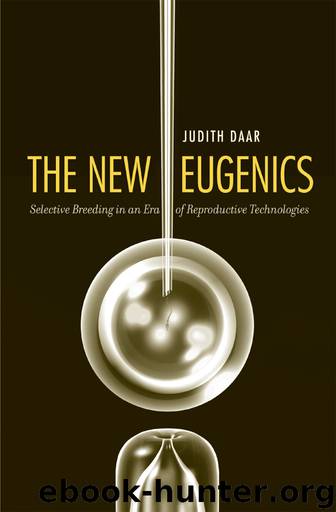The New Eugenics by Judith Daar

Author:Judith Daar [Daar, Judith]
Language: eng
Format: epub
Publisher: Yale University Press
Published: 2016-03-14T16:00:00+00:00
S • E • V • E • N
The Harms of Procreative Deprivation
In December 1982, historian and law professor Paul Lombardo had an encounter with a historical figure that would change his academic future and reshape decades-old perceptions of the American eugenics movement. In a nursing home near Charlottesville, Lombardo interviewed Carrie Buck, subject of the infamous Supreme Court decision in 1927 upholding the Virginia eugenic sterilization law. In Buck v. Bell, Justice Oliver Wendell Holmes Jr. lauded the public health benefits of compulsory sterilization, confidently asserting, “It is better for all the world, if . . . society can prevent those who are manifestly unfit from continuing their kind.”1 Holmes then added the stunning blow, “Three generations of imbeciles are enough.”2 As records discovered by Lombardo would later show, Carrie, her mother, and her daughter were of normal intelligence, the victims of a conscious campaign to implement the aspirations of several powerful eugenic enthusiasts.3 Meeting Carrie Buck, Lombardo remarked that her “frailty reflected the trials of a long hard life.”4 Newspaper accounts revealed the depth of Carrie’s enduring pain as well as that of her sister Doris, who was also forcibly sterilized, the latter lamenting, “I wanted babies bad.”5 Other victims of forced sterilization have spoken of the pain and anguish wrought by the state’s butchery, living out their lives with deep regret over their lost parenthood.6
Recent efforts to address the harms done to tens of thousands of Americans over half a century have taken shape as formal apologies and payments to surviving victims.7 This contemporary hand-wringing is an important acknowledgment that state-sponsored reproductive deprivation is among the most profound offenses a citizen can suffer. Our journey so far has queried whether barriers to ART in the form of high costs, suppressed access for racial and ethnic minorities, and treatment refusals to those who are disabled or experience social infertility resemble the thinking and tactics embraced during the eugenics movement. If so, are the harms from deprivation of assisted conception services of equal impact to those wrought by unconsensual, unwanted, and procreative-robbing surgeries? Whatever the comparison, each person deprived of an opportunity to parent by law, policy, or provider suffers gravely in ways that go beyond the first-line harm of forced childlessness. In this chapter, we explore the myriad harms produced when an infertile individual or couple is denied access to effective fertility treatment. These harms befall patients, providers, children, and society in various ways, strengthening the case that disparities in access to ART warrant attention and reform.8
Harm to ART Patients
As human beings, in the main we have a natural inclination to reproduce and to value the products of our reproductive efforts. Ask virtually any parent about the relative value of his or her life experiences, and you will most often hear, “The most significant and meaningful thing I have done in my life is parent my child(ren).” Because of the central importance of parenthood to the human experience, denial of the opportunity to procreate—through refractory infertility, lack of
Download
This site does not store any files on its server. We only index and link to content provided by other sites. Please contact the content providers to delete copyright contents if any and email us, we'll remove relevant links or contents immediately.
The Secret History by Donna Tartt(16626)
The Social Justice Warrior Handbook by Lisa De Pasquale(11489)
Thirteen Reasons Why by Jay Asher(7788)
This Is How You Lose Her by Junot Diaz(5774)
Weapons of Math Destruction by Cathy O'Neil(5037)
Zero to One by Peter Thiel(4824)
The Myth of the Strong Leader by Archie Brown(4789)
Promise Me, Dad by Joe Biden(4449)
Beartown by Fredrik Backman(4419)
Stone's Rules by Roger Stone(4416)
How Democracies Die by Steven Levitsky & Daniel Ziblatt(4399)
The Fire Next Time by James Baldwin(4343)
100 Deadly Skills by Clint Emerson(4079)
A Higher Loyalty: Truth, Lies, and Leadership by James Comey(4033)
Rise and Kill First by Ronen Bergman(4012)
The David Icke Guide to the Global Conspiracy (and how to end it) by David Icke(3883)
The Farm by Tom Rob Smith(3872)
Secrecy World by Jake Bernstein(3783)
The Doomsday Machine by Daniel Ellsberg(3731)
